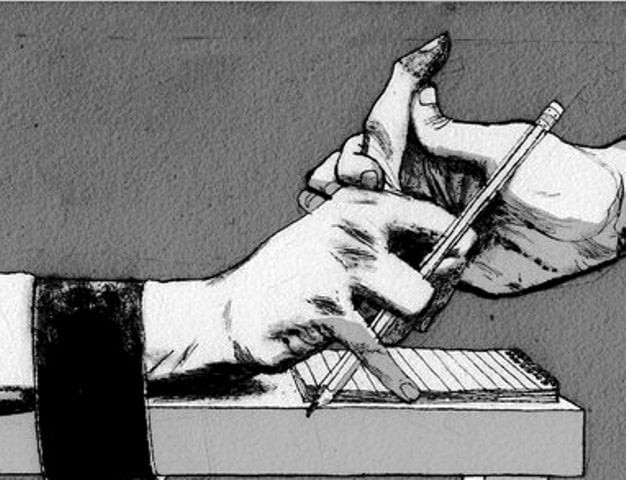Journalists under threat
Law-enforcement and intelligence agencies accused of picking up people and using intimidatory methods against them.

Violence has crept into all sections of society — students attacked the press club in Multan and killed an innocent citizen — but the beginning has been provided by the war against terrorism in which both sides of the conflict have sought to suppress what they thought was adverse coverage. It is unfortunate that while terrorists have punished those who revealed their atrocities, the state, too, has killed to hide its derelictions. Journalists reporting from the tribal areas have faced this two-pronged danger and many have died because it was humanly impossible for them to abide by the diktat of the two sides at once. Pakistan is today in the front row of countries where journalists lose their lives or are thrashed mercilessly. Law-enforcement and intelligence agencies have been accused of picking up people and of using intimidatory methods against them. In the case of Sarfaraz Shah, his brutal and merciless murder by Rangers personnel was caught on tape and seen by many a shocked and angered Pakistani. All this must come to an end and the appointment of a Supreme Court judge as chairman of the inquiry commission on the gruesome murder of Saleem Shahzad is expected to contribute to the righting of a wrong being endured by the people.
The protest launched by the PFUJ has achieved an initial success by forcing the government to take the death of Saleem Shahzad seriously. What the PFUJ might achieve further is the ‘alternative’ narrative that Shahzad honestly contributed to the ‘official version’ about the origin and spread of terrorist activities in Pakistan. His steady stream of on-the-spot reporting, interviews with al Qaeda leaders, and his book Inside Al Qaeda and the Taliban: Beyond Bin Laden and 9/11 will challenge the integrity of the inquiry commission and will persuade it to take another look at the ‘infection’ of al Qaeda within the establishment and, above all, the affair of Lal Masjid, which the judiciary has not been able to comprehend so far. The following insights mentioned in Shahzad’s book will give Pakistan the opportunity of self-correction that it direly needs:
1) It is al Qaeda rather than the Taliban who plan militant attacks in Pakistan and the Taliban execute no operations without the former’s permission; 2) jihadi organisations are subservient to al Qaeda; 3) the Tehreek-i-Taliban Pakistan was shaped by al Qaeda through Uzbek warlord Tahir Yuldashev after the 2007 Lal Masjid affair; 4) ‘retired’ army officers, earlier handling proxy jihad, defected to al Qaeda but continued to use their personal contacts with elements in the armed forces; 5) Benazir Bhutto was killed by al Qaeda and not Baitullah Mehsud; he was merely an instrument; 6) the Mumbai attack was carried out by al Qaeda through former military officers and with help from the Lashkar-e-Taiba without the knowledge of the ISI; 7) freedom fighters trained by the military for the jihad in Kashmir have spearheaded al Qaeda’s war against the armed forces; 8) Islamic radicalisation of Pakistani society and media, mixed with fear of being assassinated by al Qaeda agents — which include former military officers — have tilted the balance of power away from the state of Pakistan to al Qaeda; and 9) the so-called ‘Punjabi Taliban’ operate under the Haqqani network, which, as accusations go, is given sanctuary by the establishment.
Published in The Express Tribune, June 17th, 2011.














COMMENTS
Comments are moderated and generally will be posted if they are on-topic and not abusive.
For more information, please see our Comments FAQ